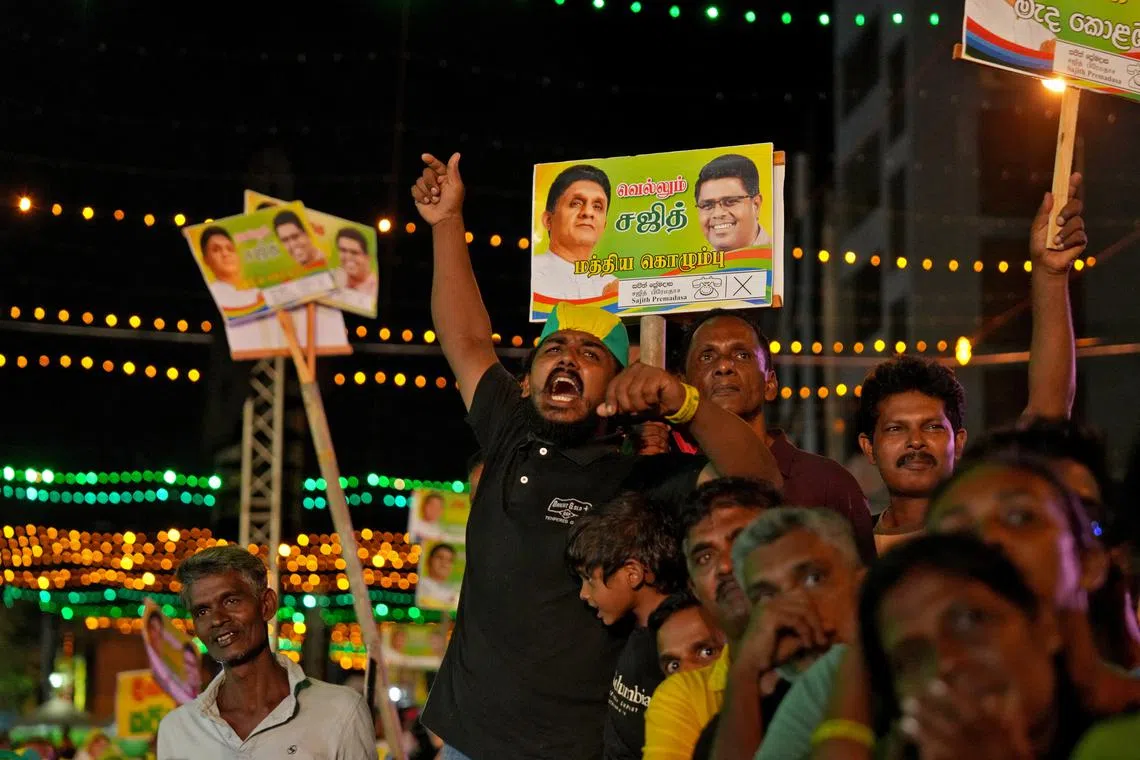With eyes on economy, Sri Lankans to vote for president in tight election
Sign up now: Get ST's newsletters delivered to your inbox

A supporter reacts during an election campaign rally for Mr Sajith Premadasa in Colombo on Sept 18, ahead of the presidential election.
PHOTO: REUTERS
Follow topic:
COLOMBO - Sri Lankans will vote for a new president in a tightly contested election on Sept 21, with the outcome expected to determine the fate of fragile economic recovery led by incumbent Mr Ranil Wickremesinghe who is facing off with left-leaning rivals.
The economy, which collapsed in 2022
Although inflation cooled to 0.5 per cent in August and GDP is forecast to grow for the first time in 2024 in three years, millions remain mired in poverty and debt, with many pinning hopes on a better future on their next leader.
“With many Sri Lankans still struggling to make ends meet, the presidential election promises to be close, tense, and possibly pivotal in setting the country’s future political trajectory,” said Mr Alan Keenan, the International Crisis Group’s senior consultant for Sri Lanka.
The election is shaping to be a close race
The Sri Lanka Opinion Tracker Survey by the Institute for Health Policy shows Mr Wickremesinghe, running as an independent, at third position. Mr Dissanayake is the leading candidate and Mr Premadasa of the centrist, more left-leaning Samagi Jana Balawegaya party is second.
Both Mr Premadasa and Mr Dissanayake have said they may tinker with taxes and public expenses linked to an International Monetary Fund (IMF) bailout programme.
Mr Dissanayake has also proposed a new homegrown approach to the debt restructuring.
Run-off likely
About 17 million of Sri Lanka's 22 million people are eligible to vote in the first election since protests against the economic hardships in 2022 forced then president Gotabaya Rajapaksa to flee the country and later resign
Mr Wickremesinghe, a former prime minister who was chosen by parliament to serve out Mr Rajapaksa's term, has managed an uncertain recovery anchored by the US$2.9 billion (S$3.7 billion) IMF bailout programme and a US$25 billion debt restructuring process.
Sri Lanka's first-past-the-post system allows voters to cast three preferential votes for their chosen candidates, with the candidate securing 50 per cent of the votes or more declared winner.
If no candidate wins 50 per cent in the first round, there is a run-off to tally preferential votes for the two frontrunners, an outcome analysts say is likely given the close nature of the election.
Most people are expected to put aside their traditional political affiliations and focus more on the economy, said Mr Dhananath Fernando, an economist at Colombo-based think tank Advocata Institute.
The result of the election is expected to be released on Sept 22 and a new president will be sworn in shortly afterwards.
Whoever wins the election will have to ensure Sri Lanka gets its public finances in order, start repaying foreign creditors, attract investment and complete the four-year IMF programme.
“The main criticism of the government is that it has not shown enough sensitivity or empathy towards the pressing problem of debt restructuring and making sure that the burden of that adjustment is not going to fall on the people least able to bear it,” said Mr Paikiasothy Saravanamuttu, head of Colombo think tank Centre for Policy Alternatives. REUTERS

